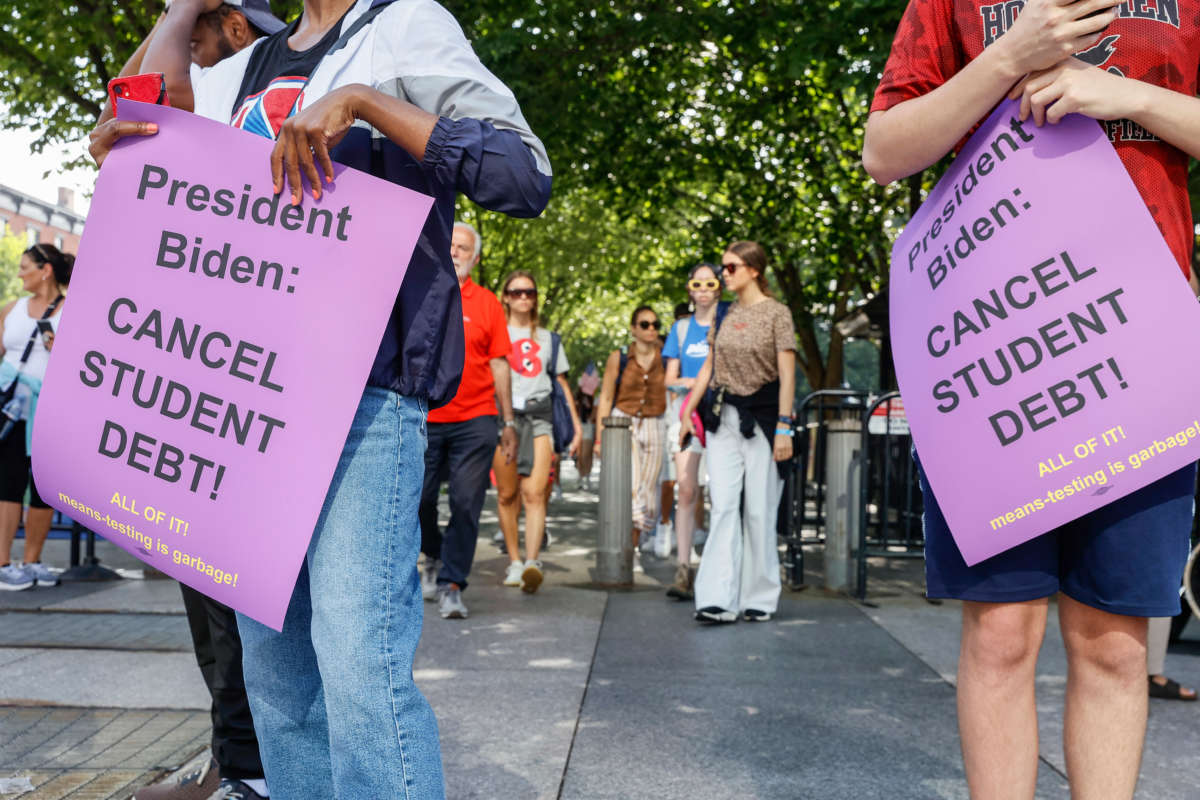Calls are growing for President Joe Biden to cancel all student debt following reports that White House officials are leaning toward a plan to cancel $10,000 of student debt for all borrowers making under $125,000 a year.
CNN reported on Monday that multiple sources familiar with White House discussions about student loan cancellation say that officials are in favor of the plan, with potential unspecified additional forgiveness for certain borrowers. After a year and a half of hesitation on the issue, Biden is expected to announce the cancellation plan as well as plans to extend the student loan payment pause, which is set to expire in about a week on August 31, on Wednesday.
This plan, which the administration has floated for months, has been highly criticized by debt activists and progressive lawmakers, who say the plan provides insufficient relief and would be complicated, if not impossible, for the Education Department to administer due to its income limits. Further, this version of the plan would affect fewer borrowers, as the White House had been considering a plan with an income threshold of $150,000 in May.
Progressive lawmakers and debt activists are saying that canceling all student debt is necessary for the roughly 45 million borrowers with student debt.
“Student debt is a nearly $2,000,000,000,000 crisis. [Biden] must #CancelStudentDebt. All of it,” wrote Rep. Cori Bush (D-Missouri). “We need broad-based student loan debt cancellation, now.”
Bush retweeted a post from the Debt Collective emphasizing that the issue of student debt cancellation is an issue of racial justice. “A reminder that you don’t start to really shrink the racial wealth gap until you cancel at least $75,000 of student debt,” the activist group wrote. “To *really* achieve racial justice, you have to cancel every single penny.”
Former Ohio state senator Nina Turner pointed out that Biden’s campaign website promised cancellation of all student debt for borrowers who make under $125,000 a year.
Student debt punishes poor and working class people for going to college. Cancel it ALL. pic.twitter.com/HxKv9SxBJZ
— Nina Turner (@ninaturner) August 22, 2022
Analyses consistently show that Black borrowers owe far more student debt than white students after graduation. A Brookings analysis last year found that Black borrowers owe on average roughly $52,700 in student debt four years after graduation, nearly double the $28,000 that white college students owe on average.
While Sen. Elizabeth Warren (D-Massachusetts) and other lawmakers have pushed for a $50,000 forgiveness plan, a Roosevelt Institute analysis found in 2020 that lawmakers should aim higher to close the racial wealth gap through student debt cancellation.
While in 2016, $50,000 of forgiveness would increase Black wealth by 40 percent, that decreased to 34 percent by 2019. Broadly canceling $75,000 of debt, meanwhile, would eliminate student debt for a much wider set of Black debtors and come closer to closing the racial wealth gap, the analysts wrote.
For debt advocates, the problem is that people who took on student loans were victims of predatory loaning from the U.S. government.
“For millions of people who have these loans, the rules were rewritten after they took on these debts,” said Student Borrower Protection Center Executive Director Mike Pierce in a hearing before Congress in May. Pierce pointed out that many borrowers, especially Black borrowers, now owe more than their original loan amount. “I don’t think [in] any place in America, people believe that predatory lenders should be able to get off scot-free.”
Progressives also pointed out that many conservative and “moderate” lawmakers are generous with the federal budget when it’s used for corporate interests or the Pentagon, but are stingy when it comes to student debt. Turner pointed out that, in 2021, the average forgiveness for the pandemic stimulus bill’s Paycheck Protection Program (PPP) loans was $95,700, according to government officials.
“I find it odd that the money trees always shake loose billions for polluting and war, but seem to always be in a drought when it comes to watering the seeds of the future,” wrote Rep. Rashida Tlaib (D-Michigan). “End this silly nonsense of exploiting our children and grandchildren. End student debt now.”
Our most important fundraising appeal of the year
December is the most critical time of year for Truthout, because our nonprofit news is funded almost entirely by individual donations from readers like you. So before you navigate away, we ask that you take just a second to support Truthout with a tax-deductible donation.
This year is a little different. We are up against a far-reaching, wide-scale attack on press freedom coming from the Trump administration. 2025 was a year of frightening censorship, news industry corporate consolidation, and worsening financial conditions for progressive nonprofits across the board.
We can only resist Trump’s agenda by cultivating a strong base of support. The right-wing mediasphere is funded comfortably by billionaire owners and venture capitalist philanthropists. At Truthout, we have you.
We’ve set an ambitious target for our year-end campaign — a goal of $225,000 to keep up our fight against authoritarianism in 2026. Please take a meaningful action in this fight: make a one-time or monthly donation to Truthout before December 31. If you have the means, please dig deep.
